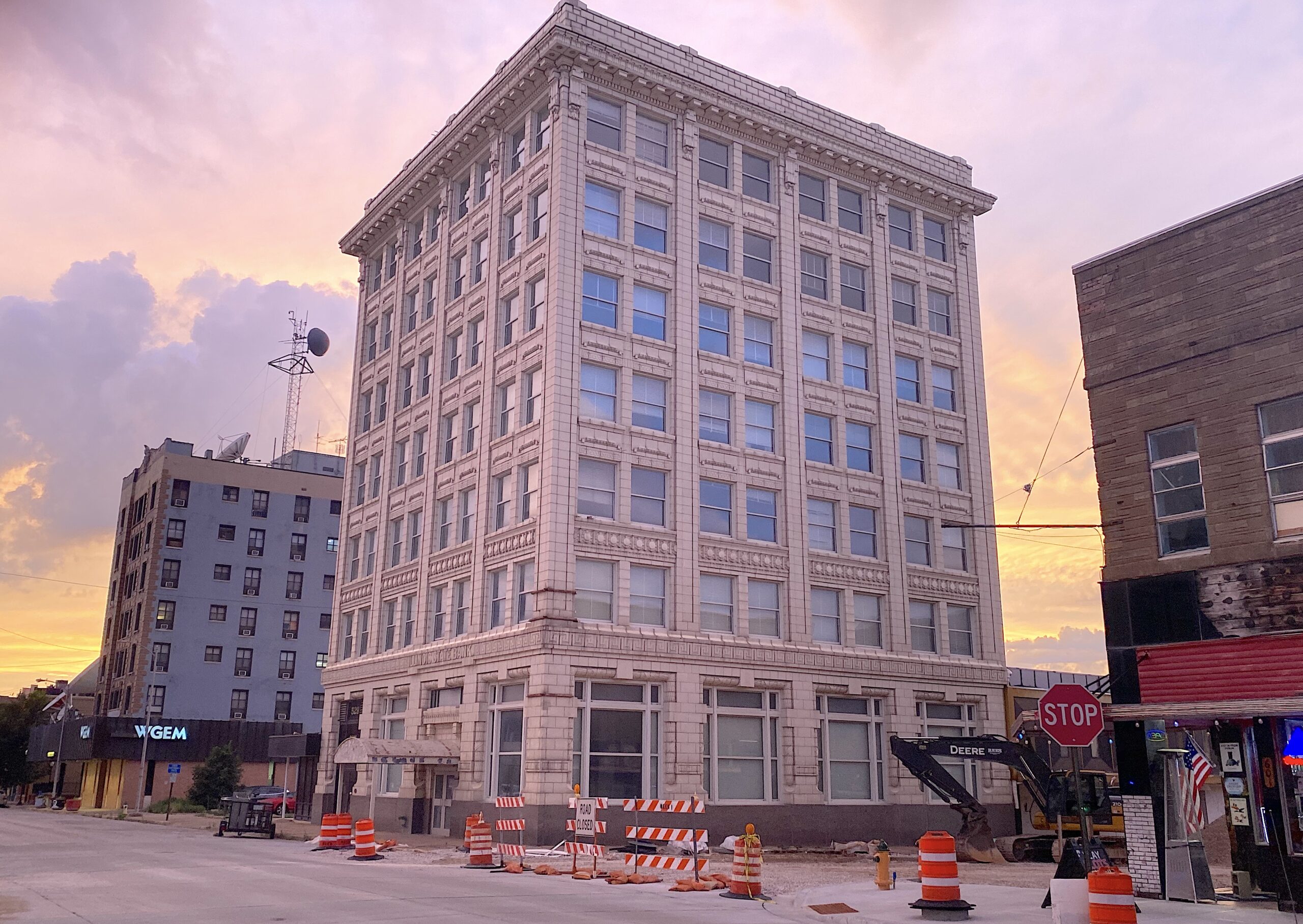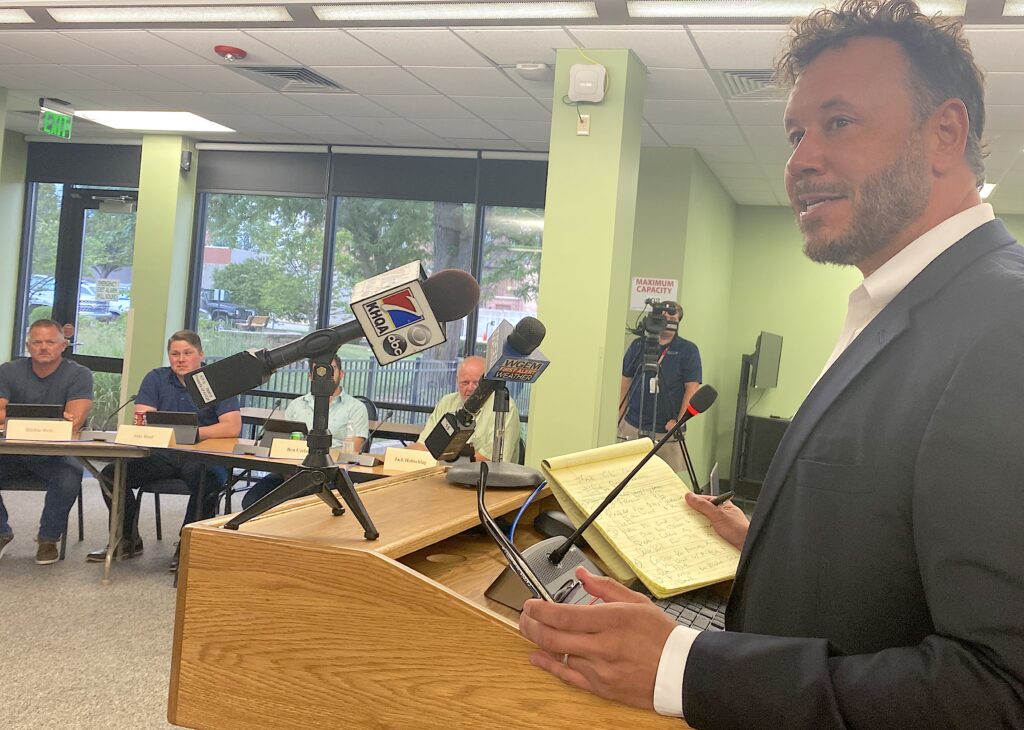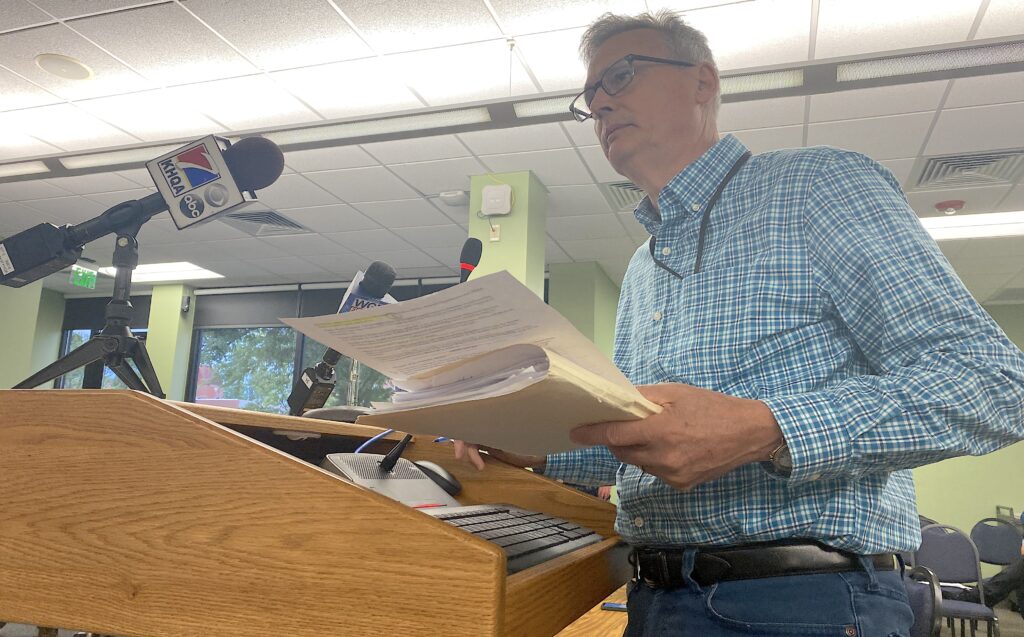‘I couldn’t be prouder of my Quincy DNA’: Aldermen OK tax rebate for Tanner’s renovation of Illinois State Bank building

QUINCY — The uncertainty shown two weeks ago by the Quincy City Council’s Finance Committee was gone Monday night when aldermen voted 11-1 to approve a $1.5 million tax rebate as part of the conversion of the former Illinois State Bank building on the northwest corner of Sixth and Hampshire into a hotel.
The Finance Committee voted during its June 25 meeting to send the proposal to the full City Council without a recommendation. However, the only alderman to vote against the proposal during Monday’s meeting at the Quincy Public Library was Jeff Bergman (D-2). Mike Farha (R-4) and Kelly Mays (R-3) were absent.
“I think questions got answered,” Mike Rein (R-5) said after the meeting. “How was it going to be funded? That wasn’t real clear two weeks ago.”
“(Tanner) said some of this at the Finance Committee meeting, but he was more explicit tonight,” Glen Ebbing (R-5) said. “Everything was very detailed about where everything was coming. He wasn’t all that clear before.”
Developer Ryan Tanner and partner Jay Krottinger are pursuing the project through their Tulsa-based Tanninger Companies. Tanner and Jon Davidshofer with Bettendorf, Iowa-based Build to Suit, Inc., made one final plea to aldermen on Monday to explain plans to convert the former bank into a 57-room hotel — now projected to cost $15 million.
Tanniger Companies received a $3 million Illinois Historic Preservation tax credit in April to preserve the architectural features of the building, which is on the register of National Historic Places. Two economic development incentives were approved by aldermen on Monday.
The city will reimburse Tanniger 50 percent of the portion of the annual property taxes generated by the hotel that would be directed to TIF East until Dec. 31, 2033. That figure would not exceed $750,000. The city also agrees to reimburse Tanniger 50 percent of the local hotel/motel sales tax generated by the hotel for a period of 10 years or until Tanniger has received $750,000, whichever occurs first.
The reimbursement of both taxes would begin once the city issues a certificate of occupancy for the hotel.
Greg Fletcher (R-1) asked Chuck Bevelheimer, director of planning, if the funding was from two sources, and neither was the city’s general fund. Bevelheimer confirmed that statement.
“So you’re using the TIF fund for really what it was designed to do,” Fletcher said. “As far as the hotel-motel tax, we’re not getting into any other hotel monies. Half of what (the hotel at Sixth and Hampshire would) generate …”


“The revenue is coming from what they generate from their project,” Bevelheimer said to complete Fletcher’s sentence.
Aldermen approved $500,000 in tax increment financing (TIF) funds in May 2021 for fire suppression and evacuation improvements as part of a $10 million proposed renovation of the seven-story building. However, that money was insufficient to convert the space into a 25-room boutique hotel with a rooftop bar and a restaurant.
“Even at $10 million, it was still very, very, very risky,” Tanner told aldermen. “Now the project has ballooned to $15 million. Our interest rate went from 4.25 in 2021 now to 8.5. We still believe in that project.
“We have done all of the work to prove to you that we are worth a risk and the chance. It’s important that you understand that as these tax dollars come back to us, we are bearing the risk. The revenue that comes back to us comes back based on what we create. If we’re not a home run, it doesn’t have an impact on you. If we are a home run, you get 50 percent. Do you know what you’re getting now? Zero.”
Tanner said that if the city didn’t approve the proposal, he would either sell the property or tear down the building.
“We don’t have any other choice because it doesn’t work from a cash-flow perspective,” he said.
Tanner said he postponed a trip to Europe for a day to attend Monday night’s meeting. He spoke to aldermen for eight minutes — five more than Quincy Mayor Mike Troup typically allows for public speakers.
Tanner was unavailable for comment after Monday’s meeting. However, he provided quotes to Muddy River News by email and text as he boarded a plane to Tulsa.
“At least with me, (Troup has) always been reasonable,” Tanner said. “To postpone a trip two years in the making I think showed our commitment. Three minutes wasn’t enough.”
Tanner said he learned last week that Mays — who he believed was a likely yes vote — would not attend the meeting.
“We had eight votes as of yesterday, but this morning when I woke up, Chuck called and said we possibly lost another vote,” Tanner said. “I reconfirmed only seven votes at 6 o’clock, then wrote my remarks. We picked up four.
“I left that meeting believing our elected officials care far more than people understand.”
The extra time before the aldermen could have made the difference.
“Tonight was an example of what happens when a government of the people, by the people and for the people works toward compromise to improve its citizens’ lives,” he said. “We are so grateful for the city’s support and leadership on the Illinois State Bank project, which is soon to become a breathtaking property that the people of Quincy can call their own. The tax revenue the hotel produces will be new revenue for Quincy. We anticipate 40 new jobs. Visitors can easily walk from the hotel to all the beautiful shops and countless locally owned restaurants.
“I cannot wait to open our doors to the public. … I couldn’t be prouder of my Quincy DNA. I read in Muddy River News recently from another developer that Tanninger Companies was essentially just an outside investor who randomly showed up. The Quincy City Council’s nearly unanimous vote in favor of this project mitigates such baseless claims and calls into question the motives of those who seek to tear others down while we try to lift others up. I’ll bet on the people of Quincy every time.”
Troup said after the meeting he believes how his office handles incentives for projects like this helped make it more palatable for aldermen.
“We’ve changed how we treat incentives,” he said. “We cap them at no more than 10 years, and we don’t give any dollars up front. You develop the operations, and then that’s how we’re going to help pay or reimburse you for the investment.”
Troup said the city has approximately 750 hotel rooms today, and the 57 rooms this project will provide are badly needed.
“We’d like to get that number back to 1,000 (hotel rooms) if not even 1,200 rooms,” he said. “We have more than 1,000 people in town for (the Greater Midwest PoolPlayers Association’s Lolla-Poolooza event) this week, but when you have only 750 hotel rooms, it makes for close quarters. It hasn’t deterred them, but we’ve got to show we’re making progress or groups like that are going to be looking elsewhere.”
Miss Clipping Out Stories to Save for Later?
Click the Purchase Story button below to order a print of this story. We will print it for you on matte photo paper to keep forever.

